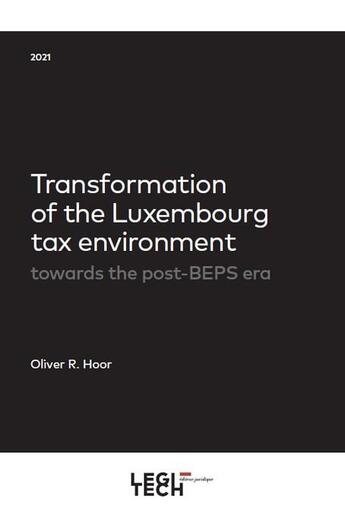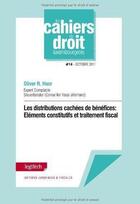-
Date de parution : 29/06/2021
-
Editeur :
Legitech
-
EAN : 9782919782857
-
Série :
(-)
-
Support :
Papier
Résumé:
Over the last years, the Luxembourg tax environment has undergone a comprehensive transformation following the OECD Base Erosion and Profit Shifting (""BEPS"") Project and subsequent initiatives at EU level.
With the transposition of the two Anti-Tax Avoidance Directives (?ATAD? and ?ATAD 2?)... Voir plus
Over the last years, the Luxembourg tax environment has undergone a comprehensive transformation following the OECD Base Erosion and Profit Shifting (""BEPS"") Project and subsequent initiatives at EU level.
With the transposition of the two Anti-Tax Avoidance Directives (?ATAD? and ?ATAD 2?) and the implementation of other tax measures into Luxembourg tax law, the Grand-Duchy contributed to a level playing field in international taxation. ATAD and ATAD 2 resulted in the implementation of a number of anti-abuse provisions including:
- Interest limitation rules - Controlled foreign company (?CFC?) rules.
- Hybrid mismatch rules.
- General Anti-abuse Rule (?GAAR?).
- Exit tax rules.
In addition, the Luxembourg legislator changed in 2019 the definition of permanent establishments (?PE?) and abolished the roll-over relief applicable to conversions of debt instruments into equity.
The Luxembourg transfer pricing regime applicable to companies performing financing activities has already been changed as from 2017, anticipating post-BEPS OECD transfer pricing guidance. Furthermore, as from 2018, the Luxembourg IP tax regime has been amended in order to comply with the modified-nexus approach that has been developed as part of the BEPS Project.
While substance was always an important topic for Luxembourg companies that are frequently involved in cross-border investment and business activities, the focus on economic substance has only increased throughout and following the OECD BEPS Project. Therefore, it is crucial to equip Luxembourg companies with an appropriate level of substance.
The OECD BEPS Project also had a significant impact on the global network of bilateral tax treaties which has been amended through the Multilateral Instrument (?MLI?). The MLI provided contracting states with a lot of flexibility in terms of implementation options and generally resulted in the adoption of anti-abuse provisions such as the principal purposes test (?PPT?).
Last but not least, the Luxembourg legislator implemented the mandatory disclosure regime (?MDR?), transposing DAC 6 into domestic law. Under the MDR, tax intermediaries are required to report information on certain cross-border arrangements to the Luxembourg tax authorities.
This book provides a 360° view on the transformation of the Luxembourg tax environment. The practical guidance in this book will equally benefit tax advisers, practitioners and other professionals that have to deal with taxation.
Donner votre avis









